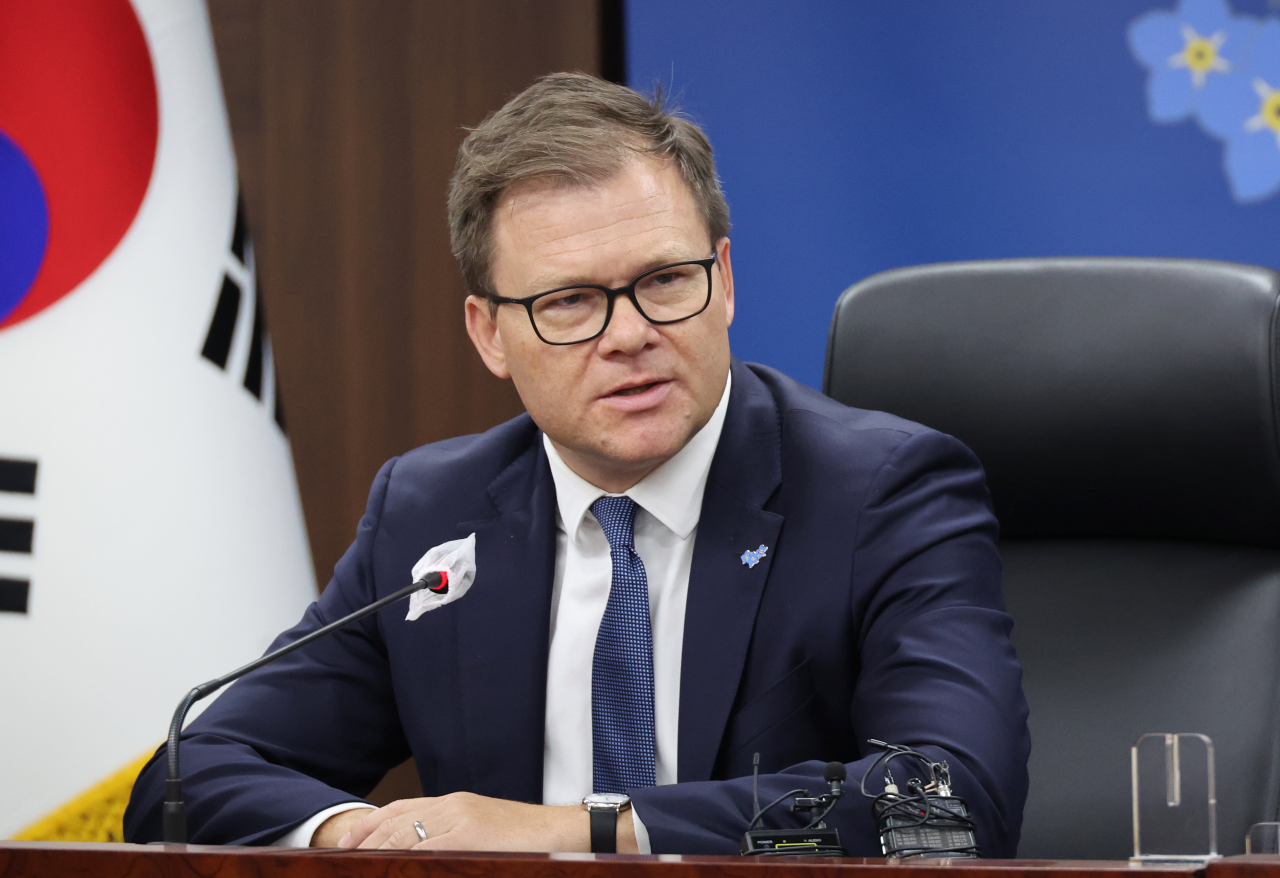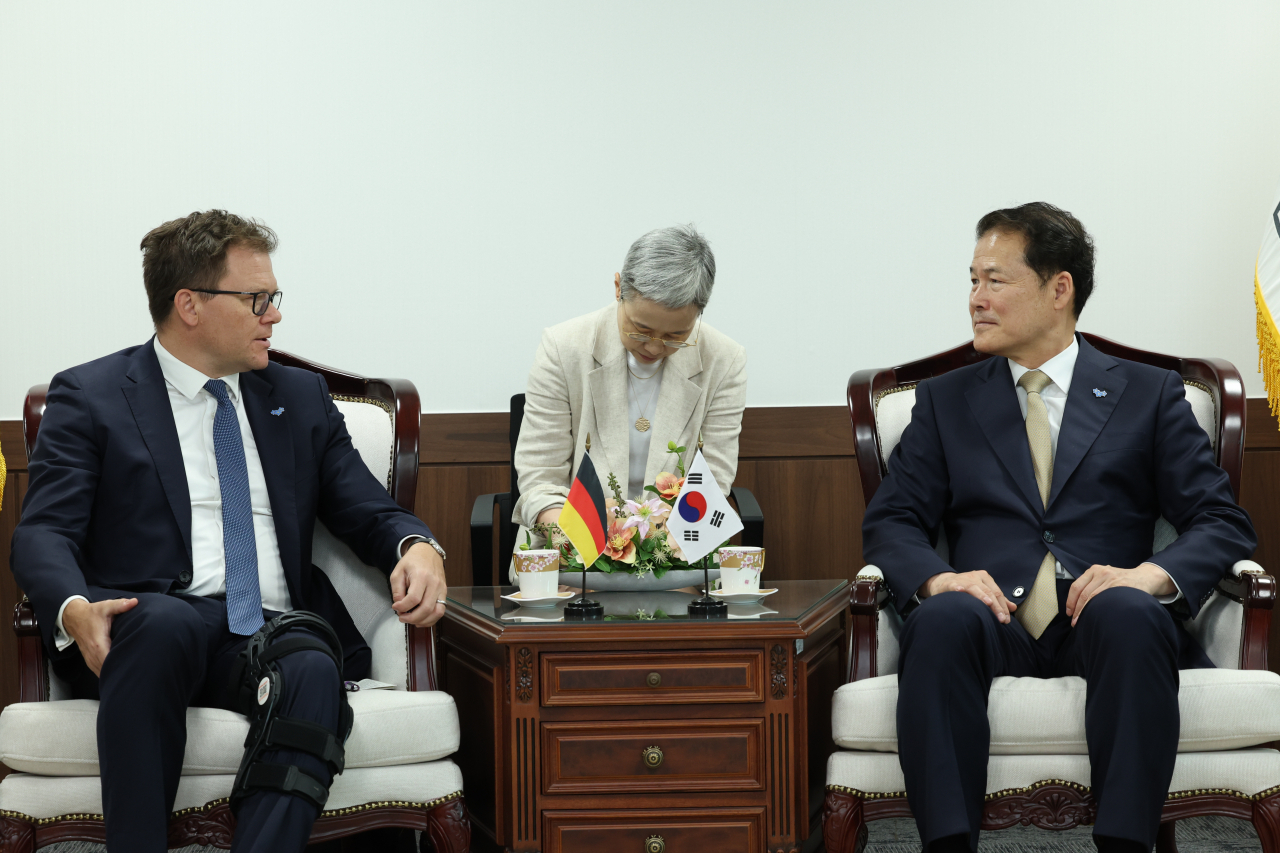East German commissioner calls on S. Korea to seize unexpected opportunities for unification
By Ji Da-gyumPublished : May 3, 2024 - 18:10

Eastern Germany Commissioner Carsten Schneider on Friday emphasized the paramount importance of South Korean leadership steadfastly pursuing the goal of unification and remaining vigilant in monitoring the North Korean situation, in order to capitalize on any unforeseen opportunity for achieving unity on the Korean Peninsula.
Schneider said that certain events unfold not by random chance, but rather at unforeseeable moments, reflecting on world history, after being asked about the feasibility of unification on the Korean Peninsula amid North Korea's shift in policy.
North Korean leader Kim Jong-un in January defined inter-Korean relations as "hostile" and "belligerent," departing from the previous description as consanguineous or homogeneous. Kim also ordered that practical measures be taken to completely eliminate the remnants of the bygone era that symbolized "reunification," "reconciliation" and "fellow countrymen."
"When looking at world history, some cases do not happen by chance, but they occur at a time that cannot be predetermined," Schneider told reporters in German after meeting with South Korean Unification Minister Kim Yung-ho in Seoul.
Schneider illustrated this point by referencing the unexpected fall of the Berlin Wall in November 1989, followed by the celebration of reunification on Oct. 3 of the subsequent year -- events that had seemed improbable just months earlier.
"The most important thing is whether to seize the opportunity and exercise political leadership. And to seize this opportunity, (South Korea) must pay attention to the situation of the people in North Korea, and must have the sense that it wants to achieve the goal of unity."
Schneider also emphasized the imperative of a "steadfast pursuit of the goal of reunification" to achieve that end.

South Korea's Unification Ministry on Friday said Kim and Schneider exchanged views on Germany's reunification experience and the matter of the unification of the Korean Peninsula.
During the meeting, Kim briefed on President Yoon Suk Yeol's new unification vision rooted in "liberalism," which has been in development amid North Korea's advocacy for two states on the Korean Peninsula.
According to the Unification Ministry, Kim "pledged to unwaveringly pursue 'peaceful unification based on liberal democratic basic order,' drawing upon the experience and lessons of German reunification, while appealing for Germany's cooperation and support" during the talks.
The ministry also stated that "Schneider emphasized the solidarity between the two countries regarding the unification and peaceful coexistence of the Korean Peninsula, expressing resonance with our vision for unification grounded in liberalism."
Additionally, both sides agreed on the importance of supporting the resettlement of North Korean defectors for social integration after reunification and pledged to cooperate in improving the human rights of North Korean residents based on universal values, according to the Unification Ministry.
Schneider visited South Korea to participate in the 13th meeting of the Korea-Germany Joint Consultation Committee on National Unification, which took place in Busan on Tuesday and Wednesday.
Speaking at the same briefing, German Ambassador to South Korea Georg Schmidt also noted that Germany has yet to determine the schedule for the opening of its embassy in Pyongyang.
The German Foreign Ministry delegation visited the country's embassy in Pyongyang in February, which has been shut down since March 2020 amid the COVID-19 pandemic.
The ambassador clarified that the purpose of the trip was a technical mission to assess the conditions for potentially reopening the embassy. The assessment included examining entry and exit protocols, as well as the availability of medical care.
During the mission, various aspects of duty of care were considered, according to Schmidt.
The ambassador, however, said, "Whether and in what size the embassy will be reopened is a political decision and it will be made in Berlin."
Schmidt emphasized that despite the embassy's closure, Germany has maintained ongoing communication with North Korea, underscoring the importance of maintaining open channels of communication, particularly during politically challenging periods.








![[KH Explains] Hyundai-backed Motional’s struggles deepen as Tesla eyes August robotaxi debut](http://res.heraldm.com/phpwas/restmb_idxmake.php?idx=644&simg=/content/image/2024/05/16/20240516050605_0.jpg&u=20240516155018)










